I have found an escaped or abandoned chicken, now what?
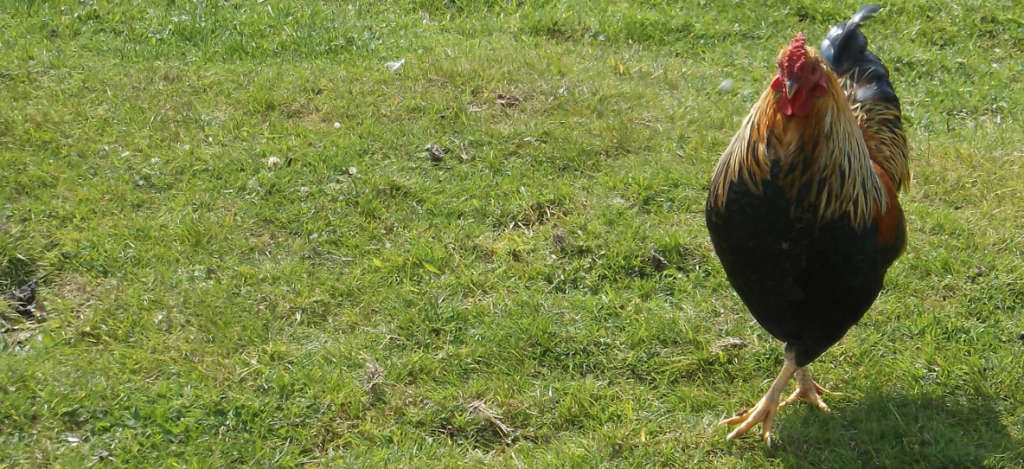
So you have found a dumped or abandoned chicken or one has appeared in your garden.
So you have found an abandoned chicken and you haven't got an idea of how to look after it. This will tell you what you need to know on how to look after it for the time it is in your care and some ideas of how to re-home it quickly and safely.
Below: Two dumped chickens appeared on my land last year.
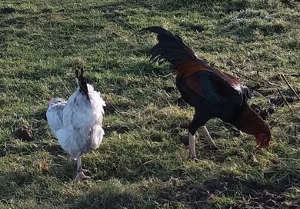
Although I write this with a chicken in mind the same basic principles apply to all farmyard or backyard poultry like ducks and turkeys.
I never fail to be amazed by how some of my birds have gone when they have lost their way.
This is the story, received via email, that inspired this article:
Today one of my bantams flew over the run fence when she got startled by my spreading fresh bedding. I had no idea she could fly that well.
Next doors Labrador chased her across the garden and she disappeared thought the back fence. I ran to try and catch her but she squeezed between a garage and a shed and disappeared around a corner.
I looked until it got dark going to my various neighbours and in their yards to try to find her.
Is there anything I can do to help my bantam home?
The answer is no, not really, when they get outside their range they are often lost and although blind luck may bring them back it becomes more unlikely with time. If they can they may follow the crow of a rooster.
There is a happy end to this tale. The Sebright in question was returned two days later after a lost/found Facebook post and was nearly 3 miles from where it was lost.
How did it get to you?
- It may have been dropped by or escaped from a predator. Even hawks have been known to drop their prey.
- It escaped. Some are quite determined and chickens are curious by nature. Young birds that are frightened may run quite a distance and can fly a couple of hundred yards into the bargain.
- It was dumped or abandoned. This is becoming an all to common practise by the unscrupulous chicken breeders. They think the birds can look after themselves in the wild but they cannot. It is often a group of surplus males that are dumped for someone else to deal with.
- Lost in transit. Ex caged hens or meat birds on their way to slaughter have escaped in the past. They are easily identified. Ex caged or battery hens will be scruffy and featherless and look just completely lost and bewildered. Escaped meat birds are very heavy and can only walk a few steps if at all.
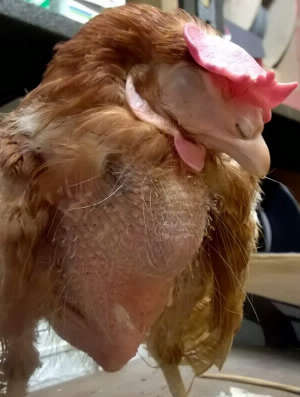
Above: An ex caged hen, they are often featherless and incapable of looking after themselves.
Has the chicken been injured?
If it has been injured it may be stood quietly in a corner or panic flapping in a bush or trying to squeeze itself under your shed. They often try to get up high or hide by wedging themselves in holes, gaps or tight spaces.
This is a difficult area as care depends on the injury. Internal injuries might not be readily seen. This is basic advice for the non chicken keeper who is trying to help.
Below is a sick chicken. They have a hunched and dishevelled look to them.
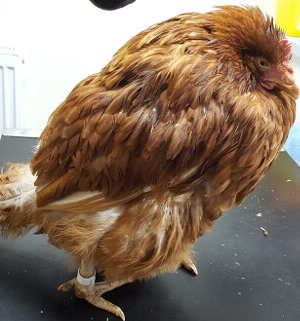
Handle with care, an injured chicken may well defend itself and a well aimed peck or kick can hurt or draw blood. If it has been dropped by or escaped from a predator or dog it will probably have bite or talon marks on its body. These often look worse than they are because of the blood in the feathers.
SEE - Dealing with a sick chicken.
Wrap the bird in a towel if it is panicking. This is a much to protect you as the chicken. Hold it tight to stop the flapping and kicking and it will soon calm down. Transfer to a dark area like the box mentioned elsewhere in this article.
Whereas a healthy bird will be alert and stood up straight or running around and getting into the branches of trees and be a slippery customer to catch.
You will need a large cardboard box or tote or something similar to put the chicken in. Some paper shredding, sawdust or sand to cover the floor of the box and a loose weave cotton towel or something similar to cover the box and exclude 90% or more of the light. This will help calm the bird and make it more manageable. Darkness will calm the bird down and make it easier to handle.
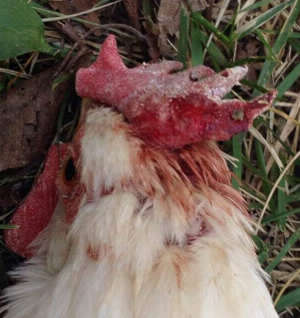
Above: A head down attitude is common with injured chickens.
I very much understand that you are probably not wanting to get into vets bills for a stray bird but it is an option and they may give free advice.
If it is very badly injured you should euthanize the bird as quickly and painlessly as you can or find someone who can.
Can you catch the chicken? And do you want to?
You will need to asses whether or not it is the best thing to catch the bird or leave it. Don't do anything that you are not somewhat comfortable with doing. This is a Japanese bantam cockerel that was dumped. I took a week to catch him and I keep chickens for a living.
Below: An escaped chicken will probably be frightened.
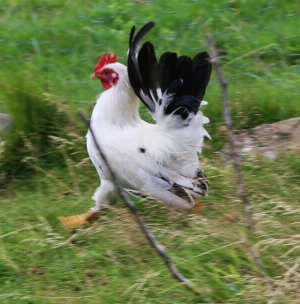
If it is just pottering around your garden it may be best to leave it. Snap a photo as this helps with identification at a later date if needed and then post to Facebook or ring your neighbours to see if they have lost a bird.
If there are more than one they are probably best left, just provide feed and water and call a chicken keeper to help.
Yes - Then pick it up carefully. Tuck it under your arm so as it does not injure itself flapping about wildly. Have a box ready to place it in and cover with a towel or cloth. It needs to be able to breathe which is why I suggest using a towel
Don't grab a loose chicken by its feathers. It will panic and flap and you will likely end up with a hand full of feathers and an even more annoyed bird.
Chickens can be caught with a large sheet and two people, get on either side of it and try to get the sheet over the bird. Drop the sheet on the chicken and then gather it up.
No - Leave it and call a chicken keeper to help you. If you do not know any post on your local Facebook group or tweet. It may also be a good idea not to try catching the chicken if you have never held one before. Throw some bird seed out for the chicken(s) as they are likely to stay where there is feed.
Don't panic the bird or put it in a sack or bag or anything like that.
How to hold a chicken if you never had before.
Some do not mind being caught and held and some hate it. Chickens are quick and you may struggle to catch it. Manoeuvre it into a garage, shed or corner or get help. A hungry bird will feed and you may be able to grab it while its attention is focused elsewhere.
Once you have caught the chicken firmly grab the bird with both hands over the top of the bird. This will cover each wing and stop it flapping.Some downward pressure will trap the chicken against the ground.
Slip one hand underneath the chicken with two fingers between the legs and one finger either side. When you lift her the legs will hang down and she wont be able to kick you or push away.
Pick her up and adjust the birds so she is facing with her head toward you and tuck her firmly under one arm between your body and upper arm.
You should have a free hand to look her over.
Is it a young bird that needs to be kept warm?
Young or injured chickens easily get lost and may need supplementary heat. In the short term this can be supplied with a well filled hot water bottle at 30 to 35 C and no more. In the longer term an ordinary incandescent light bulb in something like a desk lamp will suffice.
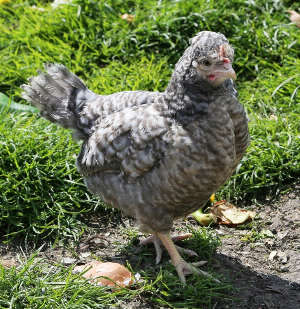
Above: Although fully feathered this youngster like this one will be missing it's mother as well as being lost and hungry and cold.
How do you look after a found chicken?
Your lost chicken will need the following if you are looking after it for more than a few hours:
- Water. Clean fresh water in a smallish container that needs to be stable, or tied to the box or tote the chicken is in. A cup is ideal as you can tie the handle to stop it tipping over.
- Feed. As you won't have chicken feed, why would you if you haven't got chickens after all. You can feed them bird seed, rolled oats, boiled and grated egg or cooked rice or cooked pearl barley from your kitchen. Cooked frozen peas or sweetcorn or pasta. Some of these foods are not good for chickens over the long term but in the day or two you have the bird whilst trying to finds it's home it will be fine. Chickens like salad and vegetables.
- Avoid certain things: You should avoid fungi, barley, citrus, lentils and avocado.
- Housing. Your garage or shed, a dog crate or large box covered with a cloth. To be calmed down birds need to be kept in the dark. You can punch holes for air all round the edges of the box and fold the top shut.
- Care. In the short while you will be looking after the chicken whilst trying to finds its home it will be fine to keep it confined and probably safer if you have dogs
So what to do with it:
Find a chicken keeper. You or a friend or neighbour may know one. Even if it is not their chicken they will be better able to look after it in the long term than you as they have the equipment, space, feed and contacts.
Drive around and ask a few people.
Post in the lost and found section of Facebook or your local group or search for chicken keepers groups.
Tweet. Use lost and found on twitter.
Local animal pounds or Society for prevention of cruelty to animals.
Veterinarians may have and idea. Fancy or breeding stud chickens may even by identity chipped.
